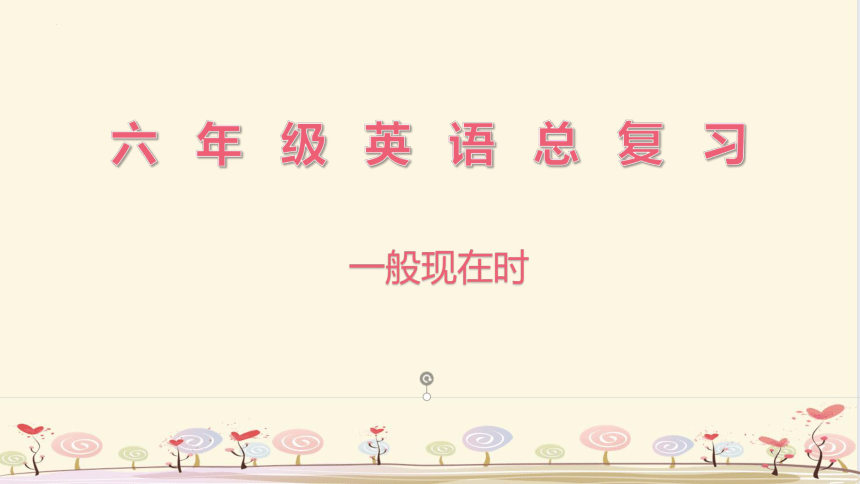(
课件网) 一般现在时 六年级英语总复习 知识梳理 考点精析 过关检测 神马是一般现在时 神马是一般现在时 We brush teeth three times a day. 神马是一般现在时 I walk my dog every day. 神马是一般现在时 The sun rises in the east. 神马是一般现在时 Nancy is beautiful. 知识梳理 一、一般现在时的用法 一般现在时表示经常性、规律性、习惯性或真理性的动作或状态,常与“always, often, usually, sometimes, seldom, never, every+时间词”等时间状语连用。如果句子中的主语是第一、第二人称或其他复数形式的名词,动词用原形;如果主语是第三人称单数形式或其他表示单数概念的名词,动词用第三人称单数形式。如: I am a student. 哪一句是一般现在时? Amy often goes swimming in summer. Do you like singing He watched TV last week. We always go to school from Monday to Friday. 哪一句是一般现在时? John sometimes goes home by bus. They will go hiking next week. She usually visits her grandparents on Saturdays. 标志词 every系列 频率系列 every day every week every month every year always usually often sometimes never 标志词 every系列 频率系列 every day every week every month every year always usually often sometimes never 每天 每周 每月 每年 总是 100% 通常 90% 经常 75% 有时 50% 从不 0% 二、动词第三人称单数形式的变化规则 1. 一般情况下,直接在动词词尾加-s。如:read→reads,play→plays 2. 以s,x,o,sh,ch结尾的动词,在词尾加-es。如:go→goes,wash→washes 3. 以辅音字母加y结尾的动词,把y改为i再加-es。如:study→studies,fly→flies 4. 特殊形式。如:have→has,be→is 2个词识别一般现在时 I Lulu your mother our teachers you it the policeman Wuhai parents Lucy and Lily that raincoat Kate my leg child 哪些是第三人称单数? 2个词识别一般现在时 I Lulu your mother our teachers you it the policeman Wuhai parents Lucy and Lily that raincoat Kate my leg child 第三人称单数 Tips: 不是你,不是我,且只有一个 第一人称主格有I,We, I am,We are,莫搞混; 第二人称主格只有you, 单数you are,复数也you are; 第三人称着重记! He is,She is,It is,They are。 第三人称:除了第一二人称; 单数:只有“1”的时候。 第三人称 单数 My father is Amy is John’s friends are Your cat is He/She/It is ...... Practise 用动词的适当形式填空。 1 She ____(get) up at 6:30 every morning. 2 His father _____(ride) a bike to go to work every day. 3 Jim _____(go) shopping on Sundays. 4 We often _____ (play) on the playground. Practise 用动词的适当形式填空。 1 She ____(get) up at 6:30 every morning. 2 His father _____(ride) a bike to go to work every day. 3 Jim _____(go) shopping on Sundays. 4 We often _____ (play) on the playground. gets rides goes plays Read and fill. 用括号内所给单词的适当形式填空。 1. He often _____ (have) dinner at home. 2. The boy always _____ (teach) his sister maths after dinner. 3. We _____ (not watch) TV on Mondays. 4. Mike and his father sometimes _____ (read) newspapers together. 5. Jack _____ (not ride) a bike to school on Fridays. has teaches don't watch read doesn't ride 构成 例子 肯定句 主语 + am/is/are +其他 I am a teacher . 我是一名教师。 否定句 主语 + am ... ...

